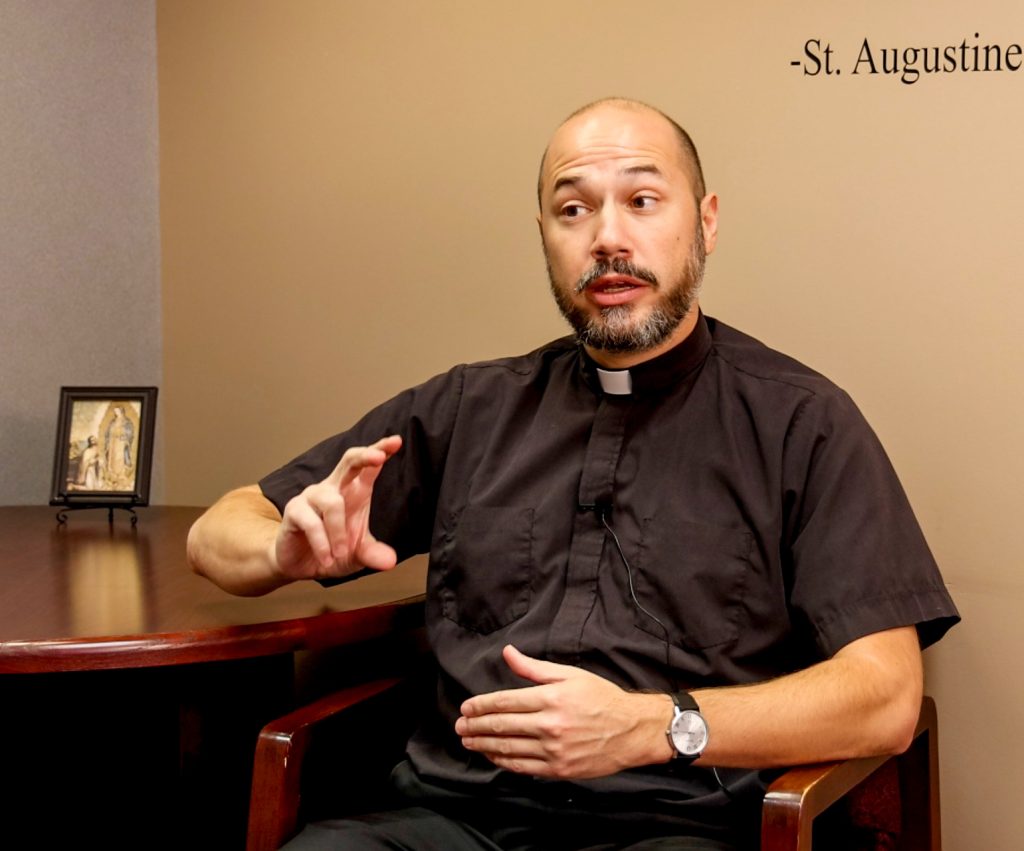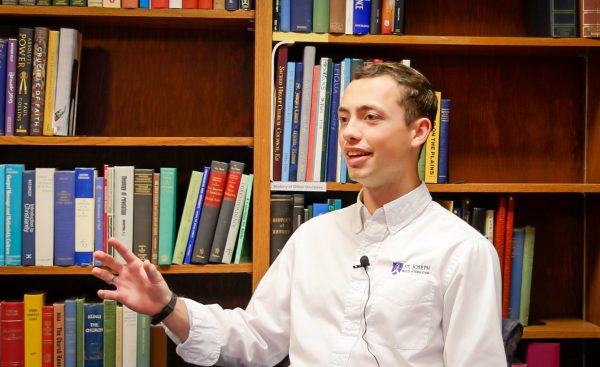Appeal helps seminarians focus on their formation and studies, not finances

Want to help seminarians and retired priests?
The annual Christmas Call to Sharing appeal helps educate priests-to-be and priests who have generously served the Diocese of Wichita. The appeal is made on the fourth Sunday of Advent, this year on Dec. 24. Checks should be made out to one’s parish with a notation of “Christmas Call to Sharing.”
Sam Schmidt decided after his freshman year at Kansas State University that he would act on a recurring thought to consider the priesthood.
“When I was younger I think it would be on my mind a little bit and then it would fade away,” he said in a recent interview. “I got to college…I decided I’m really going to get into this. There’s no more duplicity.”
After consistent prayer and study of the scriptures, Schmidt said, “I started hearing the Lord say, okay, I want you to think more seriously about this.”
He said he “ran away from it” again but later decided to listen to the Lord and applied to the St. Joseph House of Formation, the Diocese of Wichita’s minor seminary on the campus of St. Joseph Parish in Wichita.

The Wichita seminarians are students at Newman University and study philosophy which Schmidt said is “wonderfully confusing and vague and abstract. But I’ve found the atmosphere of study at the House and the way that they take care of us and the teachers that we have, they make it as easy as philosophy can be.”
He said philosophy helps him understand how the world is, and how to make sense of the world.
Schmidt said one of the challenges – and a beauty – of seminary life is learning to live with a large group of other people. “Also the vigorous growth that is asked of the seminarians. It’s like a spiritual boot camp, a breaking down to learn how to do his will and learn how to do what the Lord is wanting, rather than trying to give our own will to our lives and do what we want to do.”
There is a beauty in that “breaking down,” he said. “It’s taught me how to give more freely and more joyfully. Like when the Lord asks for something, I’m able to give it to him, and it’s not burdensome, but it actually has become quite a joy to give him things that I would have never even thought about giving to him before.”
Focusing without anxiety
Schmidt said the Priests Retirement and Education Fund allows him and his brother seminarians to study without having the idea of student debt in the background of their lives. “I found that there comes this great freedom to being able to discern, to be able to enter seminary, to leave, if that’s what the Lord is asking, without any worry about what is this going to cost me materially?”
The seminarians who become priests or leave the seminary can be confident they are doing God’s will, he said, and aren’t being manipulated by questions of finances. “I think that’s the greatest gift. What we need is being provided for us, and we don’t have to wonder how am I going to take care of myself if I leave?
“We don’t have to wonder, okay, if I join seminary, how am I going to pay for that? If I leave seminary, how am I going to pay that back? Is it worthwhile? Is it not? We can actually just freely enter into the discernment and say, okay, I want to find out what the Lord wants for me.”
Schmidt said he wants donors to the fund to know their gifts are received with gratitude. “That helps us discern well, to live well, to form our relationships with each other at the house, and actually discover what it is that the Lord is wanting to do with us and for us in our lives.”
Fr. Chad Arnold
Fr. Chad Arnold wears two director’s hats but both roles have the same objective: to form good priests.\
Fr. Arnold is director of the House of Formation and of Seminarians. He oversees the 43 seminarians studying for the Diocese of Wichita. Twenty-seven of the men live in the St. Joseph House of Formation in Wichita; six are at Kenrick-Glennon Seminary in St. Louis, Missouri; and nine at Mundelein Seminary in Chicago.
Forming good priests involves helping them develop a “profound relationship with our Lord,” he said, and teaching them how to develop that relationship.
Seminary training is not only designed to help the men to lovingly administer the sacraments, Fr. Arnold said, “but also how to meet with people, how to engage them, how to be inviting with the Gospel, how to comfort people when they’re in need, to be able to go through a day centered on the Lord and be able to interact with people at the high points of their life, but also at the low points of life and everywhere in between.”
Examples of Christ
They are being trained to exemplify the love of Christ, he said.
The challenges of training seminarians are not unique to the diocese, he said. “One is helping guys to be able to hear, to recognize, and respond to the voice of Christ. In our world and our culture, there’s just so much information coming at them, there are so many distractions that we are less accustomed to being quiet and listening for the Lord and paying attention to what that is.
Seminarians are no different than other young men, Fr. Arnold said. “They bring in different difficulties and different blind spots.
Formation is individualistic
“So, formation has to be very individualistic. You can’t just put a guy into a program and expect everything to go fine, you’ve got to know his heart. You’ve got to be able to have conversations with him. It’s an act of discovery – even with him – of: Where are my pitfalls? Where are my weaknesses? Where are my strengths? The only way to do that is a lot of prayer, a lot of time, and a lot of listening to the man himself.”
Fr. Arnold said seminary formation involves substantial costs that the diocese chooses to cover for the seminarians. “We want the men to be able to enter into seminary and not be thinking about financial responsibilities, but be thinking about the work the Lord wants to do in their heart. We want them to focus on their prayer. We want them to focus on their studies. We want them to focus on growing. And in order to allow them to focus, we as a diocese take on the responsibility of covering all their costs for education, room and board.”
That’s a sizable commitment, he said.
“Making sure that we are able to continue to do that because that is the most fruitful way to ensure that they can really focus on their formation. They’re not worried about…I got to get a job over Christmas break, or I got to work during the summer to make these monies, or I’ve got to go into debt to pay for this education that, frankly, I would never be able to pay that debt off with a priestly salary if the Lord was calling me to that.”
One of the joys of overseeing the formation of seminarians, Father said, is “when something clicks and the seminarians recognizes the Lord in his life and he has kind of that ‘aha’ moment. That’s a beautiful thing to see.”
Win-win situation
The church benefits even if a seminarian doesn’t go on to be ordained, he said.
“We don’t make them pay it back, but they step out as a better person. And I hear from pastors and from some of their spouses in the future about what a good person they are and how they’re living their faith and how they’re bringing those things that we taught them in seminary to fruition now.”
Seeing the men being ordained, though, is a great joy, Fr. Arnold said. “In a way, you could say all that the diocese has invested in him and now he’s turning around and giving that all back to the people for ideally the rest of his life.”
He also enjoys the banter between the newly ordained priests and the retired priests who share their war stories and their experiences with the newly ordained. “There are just so many blessings or moments that I personally get a front seat to.”
The support of the faithful of the diocese is integral in the formation of seminarians, he said.
Forming the future
“The Priests Retirement and Education Fund does span a large time period: It helps support a man when he enters into seminary, it helps support a priest at the end of his life. This fund really gives to the priestly life when it’s at its most vulnerable: in the very beginning, when it’s just being nurtured when it’s just being formed, and learning how to live this life.”
It also is there when the priests retire from their service to the diocese, he said.
“They need help. There’s a lot the retired priests can’t do for themselves because of their failing health Holy Door sealed at nation’s largest Catholic church. In both of those scenarios, the Priests Retirement And Education Fund comes in and says, you know, you have done a lot or you’re going to do a lot. Let us support you. Let us help you in this and take care of them in their moment of need.”
Fr. Arnold said those who donate to the fund are helping form the priests of tomorrow and those who spent their lives taking care of others. “And so I think first and last I would just say thank you.”
